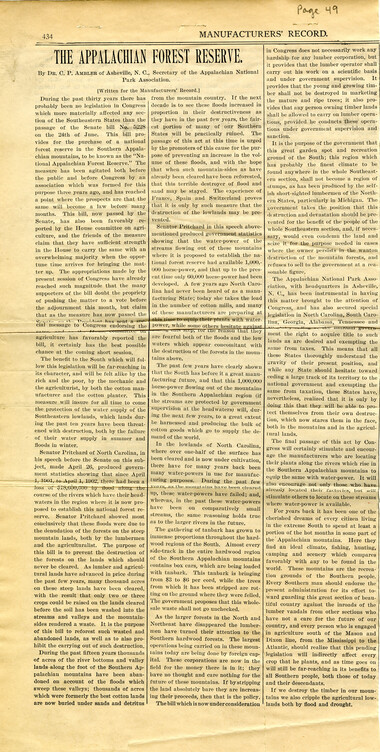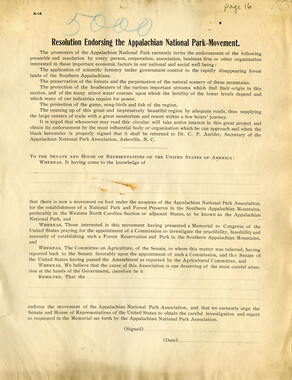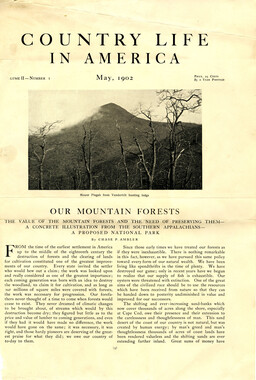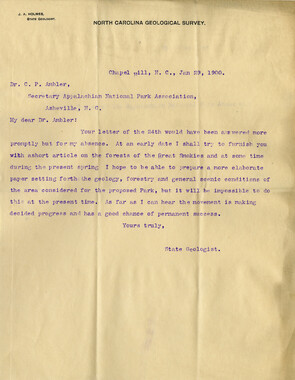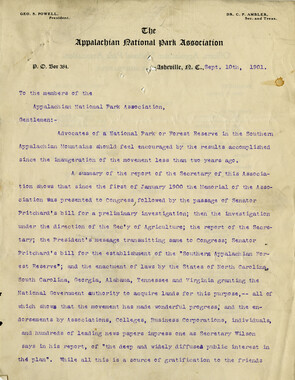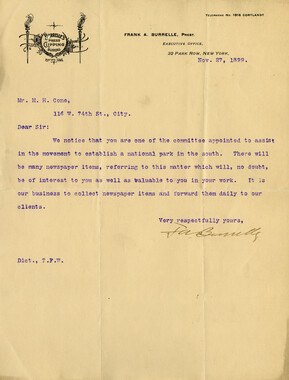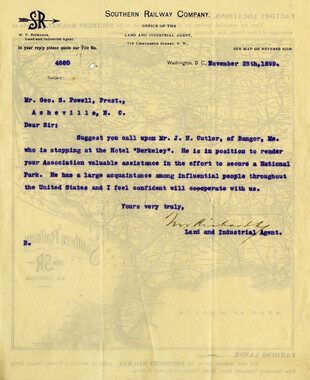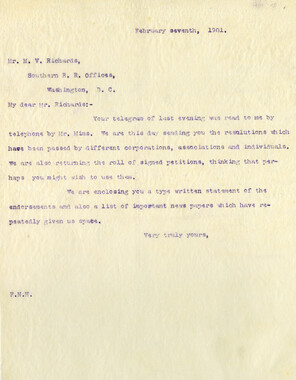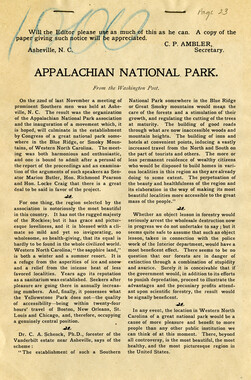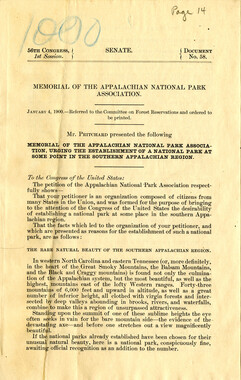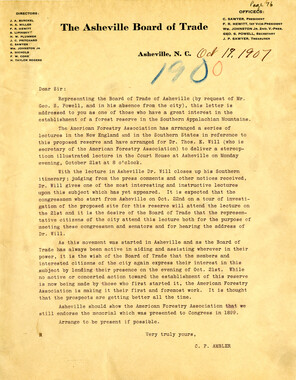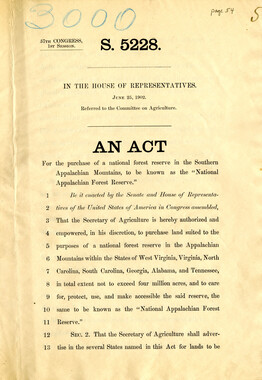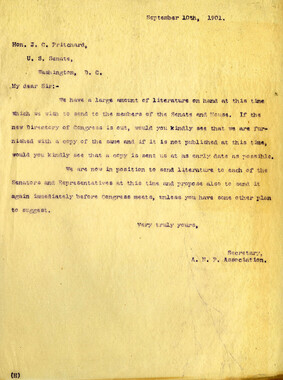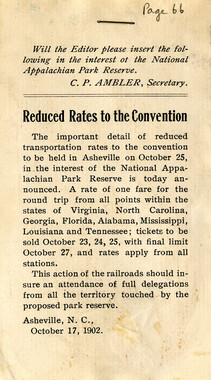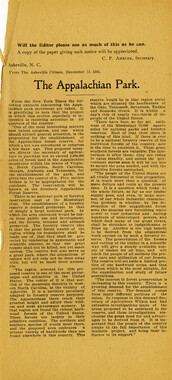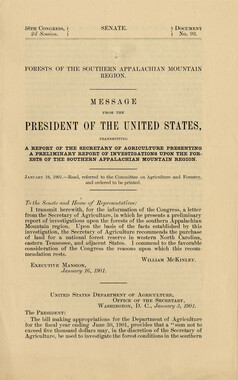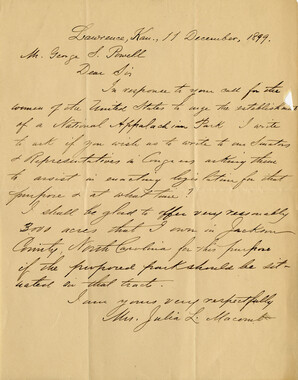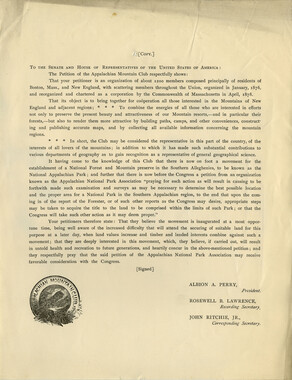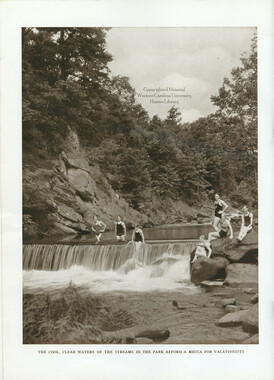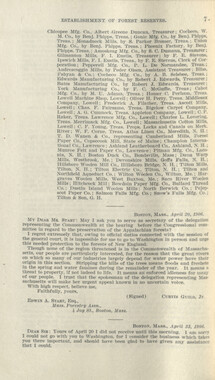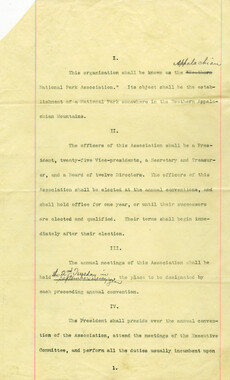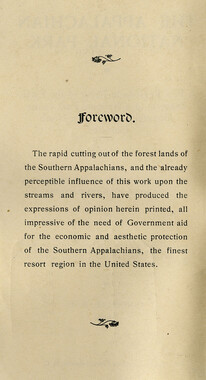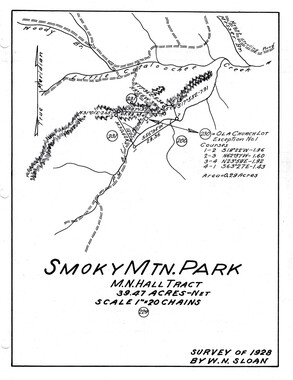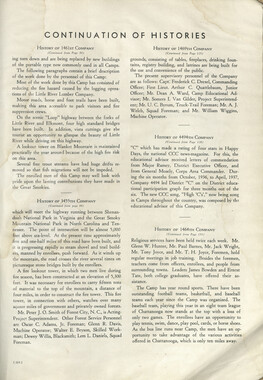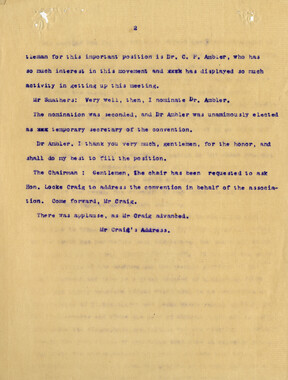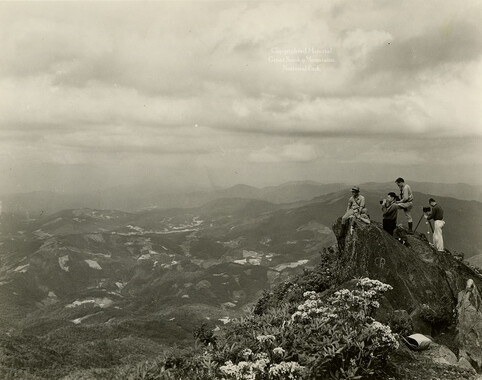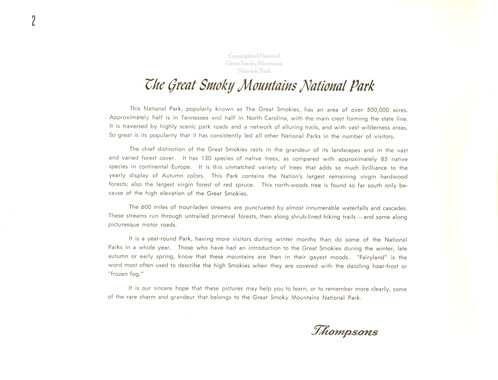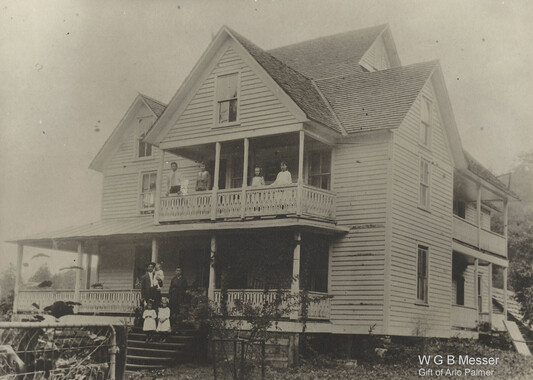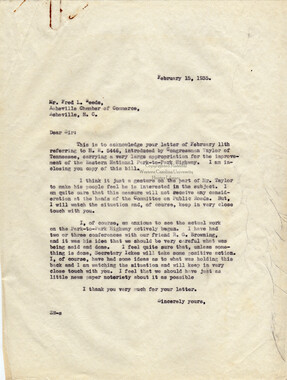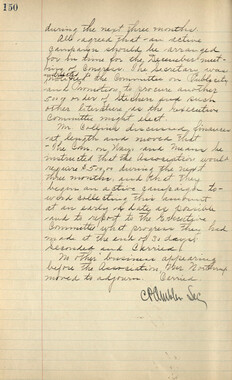Western Carolina University (1)
View all
- Great Smoky Mountains - A Park for America (336)
- Canton Champion Fibre Company (0)
- Cherokee Traditions (0)
- Civil War in Southern Appalachia (0)
- Craft Revival (0)
- Highlights from Western Carolina University (0)
- Horace Kephart (0)
- Journeys Through Jackson (0)
- LGBTQIA+ Archive of Jackson County (0)
- Oral Histories of Western North Carolina (0)
- Picturing Appalachia (0)
- Stories of Mountain Folk (0)
- Travel Western North Carolina (0)
- Western Carolina University Fine Art Museum Vitreograph Collection (0)
- Western Carolina University Herbarium (0)
- Western Carolina University: Making Memories (0)
- Western Carolina University Publications (0)
- Western Carolina University Restricted Electronic Theses and Dissertations (0)
- Western North Carolina Regional Maps (0)
- World War II in Southern Appalachia (0)
University of North Carolina Asheville (0)
View all
- Faces of Asheville (0)
- Forestry in Western North Carolina (0)
- Grove Park Inn Photograph Collection (0)
- Isaiah Rice Photograph Collection (0)
- Morse Family Chimney Rock Park Collection (0)
- Picturing Asheville and Western North Carolina (0)
- Appalachian National Park Association (53)
- Schenck, Carl Alwin, 1868-1955 (1)
- Allanstand Cottage Industries (0)
- Bennett, Kelly, 1890-1974 (0)
- Berry, Walter (0)
- Brasstown Carvers (0)
- Cain, Doreyl Ammons (0)
- Carver, George Washington, 1864?-1943 (0)
- Cathey, Joseph, 1803-1874 (0)
- Champion Fibre Company (0)
- Champion Paper and Fibre Company (0)
- Cherokee Indian Fair Association (0)
- Cherokee Language Program (0)
- Crittenden, Lorraine (0)
- Crowe, Amanda (0)
- Edmonston, Thomas Benton, 1842-1907 (0)
- Ensley, A. L. (Abraham Lincoln), 1865-1948 (0)
- Fromer, Irving Rhodes, 1913-1994 (0)
- George Butz (BFS 1907) (0)
- Goodrich, Frances Louisa (0)
- Grant, George Alexander, 1891-1964 (0)
- Heard, Marian Gladys (0)
- Kephart, Calvin, 1883-1969 (0)
- Kephart, Horace, 1862-1931 (0)
- Kephart, Laura, 1862-1954 (0)
- Laney, Gideon Thomas, 1889-1976 (0)
- Masa, George, 1881-1933 (0)
- McElhinney, William Julian, 1896-1953 (0)
- Niggli, Josephina, 1910-1983 (0)
- North Carolina Park Commission (0)
- Osborne, Kezia Stradley (0)
- Owens, Samuel Robert, 1918-1995 (0)
- Penland Weavers and Potters (0)
- Rhodes, Judy (0)
- Roberts, Vivienne (0)
- Roth, Albert, 1890-1974 (0)
- Sherrill's Photography Studio (0)
- Smith, Edward Clark (0)
- Southern Highland Handicraft Guild (0)
- Southern Highlanders, Inc. (0)
- Stalcup, Jesse Bryson (0)
- Stearns, I. K. (0)
- Thompson, James Edward, 1880-1976 (0)
- United States. Indian Arts and Crafts Board (0)
- USFS (0)
- Vance, Zebulon Baird, 1830-1894 (0)
- Weaver, Zebulon, 1872-1948 (0)
- Western Carolina College (0)
- Western Carolina Teachers College (0)
- Western Carolina University (0)
- Western Carolina University. Mountain Heritage Center (0)
- Whitman, Walt, 1819-1892 (0)
- Wilburn, Hiram Coleman, 1880-1967 (0)
- Williams, Isadora (0)
- 1880s (1)
- 1890s (61)
- 1900s (268)
- 1910s (94)
- 1920s (26)
- 1600s (0)
- 1700s (0)
- 1800s (0)
- 1810s (0)
- 1820s (0)
- 1830s (0)
- 1840s (0)
- 1850s (0)
- 1860s (0)
- 1870s (0)
- 1930s (0)
- 1940s (0)
- 1950s (0)
- 1960s (0)
- 1970s (0)
- 1980s (0)
- 1990s (0)
- 2000s (0)
- 2010s (0)
- 2020s (0)
- Appalachian Region, Southern (67)
- Avery County (N.C.) (4)
- Blount County (Tenn.) (1)
- Buncombe County (N.C.) (158)
- Cherokee County (N.C.) (2)
- Graham County (N.C.) (2)
- Great Smoky Mountains National Park (N.C. and Tenn.) (3)
- Haywood County (N.C.) (5)
- Henderson County (N.C.) (13)
- Jackson County (N.C.) (24)
- Knox County (Tenn.) (4)
- Macon County (N.C.) (7)
- Madison County (N.C.) (12)
- McDowell County (N.C.) (3)
- Mitchell County (N.C.) (1)
- Polk County (N.C.) (1)
- Qualla Boundary (1)
- Rutherford County (N.C.) (16)
- Swain County (N.C.) (3)
- Transylvania County (N.C.) (36)
- Watauga County (N.C.) (1)
- Yancey County (N.C.) (18)
- Asheville (N.C.) (0)
- Clay County (N.C.) (0)
- Knoxville (Tenn.) (0)
- Lake Santeetlah (N.C.) (0)
- Waynesville (N.C.) (0)
- Artifacts (object Genre) (4)
- Clippings (information Artifacts) (17)
- Envelopes (1)
- Financial Records (7)
- Fliers (printed Matter) (29)
- Letters (correspondence) (74)
- Manuscripts (documents) (4)
- Maps (documents) (7)
- Memorandums (8)
- Minutes (administrative Records) (20)
- Newsletters (1)
- Photographs (139)
- Publications (documents) (8)
- Scrapbooks (3)
- Speeches (documents) (10)
- Transcripts (21)
- Aerial Photographs (0)
- Aerial Views (0)
- Albums (books) (0)
- Articles (0)
- Bibliographies (0)
- Biography (general Genre) (0)
- Cards (information Artifacts) (0)
- Crafts (art Genres) (0)
- Depictions (visual Works) (0)
- Design Drawings (0)
- Drawings (visual Works) (0)
- Facsimiles (reproductions) (0)
- Fiction (general Genre) (0)
- Glass Plate Negatives (0)
- Guidebooks (0)
- Internegatives (0)
- Interviews (0)
- Land Surveys (0)
- Negatives (photographs) (0)
- Newspapers (0)
- Occupation Currency (0)
- Paintings (visual Works) (0)
- Pen And Ink Drawings (0)
- Periodicals (0)
- Personal Narratives (0)
- Plans (maps) (0)
- Poetry (0)
- Portraits (0)
- Postcards (0)
- Programs (documents) (0)
- Questionnaires (0)
- Sheet Music (0)
- Slides (photographs) (0)
- Songs (musical Compositions) (0)
- Sound Recordings (0)
- Specimens (0)
- Text Messages (0)
- Tintypes (photographs) (0)
- Video Recordings (physical Artifacts) (0)
- Vitreographs (0)
- Appalachian National Park Association Records (336)
- A.L. Ensley Collection (0)
- Appalachian Industrial School Records (0)
- Axley-Meroney Collection (0)
- Bayard Wootten Photograph Collection (0)
- Bethel Rural Community Organization Collection (0)
- Blumer Collection (0)
- C.W. Slagle Collection (0)
- Canton Area Historical Museum (0)
- Carlos C. Campbell Collection (0)
- Cataloochee History Project (0)
- Cherokee Studies Collection (0)
- Daisy Dame Photograph Album (0)
- Daniel Boone VI Collection (0)
- Doris Ulmann Photograph Collection (0)
- Elizabeth H. Lasley Collection (0)
- Elizabeth Woolworth Szold Fleharty Collection (0)
- Frank Fry Collection (0)
- George Masa Collection (0)
- Gideon Laney Collection (0)
- Hazel Scarborough Collection (0)
- Hiram C. Wilburn Papers (0)
- Historic Photographs Collection (0)
- Horace Kephart Collection (0)
- Humbard Collection (0)
- Hunter and Weaver Families Collection (0)
- I. D. Blumenthal Collection (0)
- Isadora Williams Collection (0)
- Jesse Bryson Stalcup Collection (0)
- Jim Thompson Collection (0)
- John B. Battle Collection (0)
- John C. Campbell Folk School Records (0)
- John Parris Collection (0)
- Judaculla Rock project (0)
- Kelly Bennett Collection (0)
- Love Family Papers (0)
- Major Wiley Parris Civil War Letters (0)
- Map Collection (0)
- McFee-Misemer Civil War Letters (0)
- Mountain Heritage Center Collection (0)
- Norburn - Robertson - Thomson Families Collection (0)
- Pauline Hood Collection (0)
- Pre-Guild Collection (0)
- Qualla Arts and Crafts Mutual Collection (0)
- R.A. Romanes Collection (0)
- Rosser H. Taylor Collection (0)
- Samuel Robert Owens Collection (0)
- Sara Madison Collection (0)
- Sherrill Studio Photo Collection (0)
- Smoky Mountains Hiking Club Collection (0)
- Stories of Mountain Folk - Radio Programs (0)
- The Reporter, Western Carolina University (0)
- Venoy and Elizabeth Reed Collection (0)
- WCU Gender and Sexuality Oral History Project (0)
- WCU Mountain Heritage Center Oral Histories (0)
- WCU Oral History Collection - Mountain People, Mountain Lives (0)
- WCU Students Newspapers Collection (0)
- Western North Carolina Tomorrow Black Oral History Project (0)
- William Williams Stringfield Collection (0)
- Zebulon Weaver Collection (0)
- Floods (1)
- Forest conservation (11)
- Forests and forestry (11)
- Great Smoky Mountains National Park (N.C. and Tenn.) (1)
- Hunting (1)
- Logging (1)
- Maps (8)
- African Americans (0)
- Appalachian Trail (0)
- Artisans (0)
- Cherokee art (0)
- Cherokee artists -- North Carolina (0)
- Cherokee language (0)
- Cherokee pottery (0)
- Cherokee women (0)
- Church buildings (0)
- Civilian Conservation Corps (U.S.) (0)
- College student newspapers and periodicals (0)
- Dams (0)
- Dance (0)
- Education (0)
- Folk music (0)
- Forced removal, 1813-1903 (0)
- Gender nonconformity (0)
- Landscape photography (0)
- Mines and mineral resources (0)
- North Carolina -- Maps (0)
- Paper industry (0)
- Postcards (0)
- Pottery (0)
- Railroad trains (0)
- Rural electrification -- North Carolina, Western (0)
- School integration -- Southern States (0)
- Segregation -- North Carolina, Western (0)
- Slavery (0)
- Sports (0)
- Storytelling (0)
- Waterfalls -- Great Smoky Mountains (N.C. and Tenn.) (0)
- Weaving -- Appalachian Region, Southern (0)
- Wood-carving -- Appalachian Region, Southern (0)
- World War, 1939-1945 (0)
- StillImage (141)
- Text (195)
- MovingImage (0)
- Sound (0)
Editorial in Manufacturers' Record
-
This short article, “The Appalachian Forest Reserve” was written for the “Manufacturers’ Record.” The article argues for support of Senate bill 5228, which “provides for the purchase of a national forest reserve in the Southern Appalachian mountains.” Concerned about the destruction of forests, the article states that the bill would “prevent the destruction of the forests on the lands which should never be cleared.” The article was penned by Chase P. Ambler (1865-1932), a founding member and long-time secretary of the Appalachian National Park Association
-
-
p*Y- H°l 434 MANUFACTURERS' RECORD. THE APPALACHIAN FOREST RESERVE. By Dk. 0. P. Amblek of Asheville, N. 0., Secretary of the Appalachian National Park Association. [Written for the Manufacturers' Record.] During the past thirty years there has probably been no legislation in Congress which more materially affected any section of the Southeastern States than the passage of the Senate bill No. 5228 on the 24th of June. This bill provides for the purchase of a national forest reserve in the Southern Appalachian mountains, to be known as the "National Appalachian Forest Reserve." The measure has been agitated both before the public and before Congress by an association which was formed for this purpose three years ago, and has reached a point where the prospects are that the same will become a law before many months. This bill, now passed by the Senate, has also been favorably reported by the House committee on agriculture, and the friends of the measure claim that they have sufficient strength in the House to carry the same with an overwhelming majority when the opportune time arrives for bringing the matter up. The appropriations made by the present session of Congress have already reached such magnitude that the many supporters of the bill doubt the propriety of pushing the matter to a vote before the adjournment this month, but claim that as the measure has now passed the o,.,..,i„ ,.,. ti,. T>,;r,c.;,1„n+ J,ns SPI,f a sro. cial message to Congress endorsing the Ji. eWEHEHSHt agriculture has favorably reported the bill, it certainly has the best possible chance at the coming short session. The benefit to the South which will follow this legislation will be far-reaching in its character, and will be felt alike by the rich and the poor, by the mechanic and the agriculturist, by both the cotton manufacturer and the cotton planter. This measure will insure for all time to come the protection of the water supply of the Southeastern lowlands, which lands during the past ten years have been threatened with destruction, both by the failure of their water supply in summer and floods in winter. Senator Pritchard of North Carolina, in his speech before the Senate on this subject, made April 26, produced government statistics showing that since April 45-*&-Ajm4LV1002, there had been a joss Ttr~"^ju5jutKt,"voo try flood along—tirrrr course of the rivers which have their headwaters in the region where it is now proposed to establish this national forest reserve. Senator Pritchard showed most conclusively that these floods were due to the denudation of the forests on the steep mountain lauds, both by the lumbermen and the agriculturalist. The purpose of this bill is to prevent the destruction of the forests on the lands which should never be cleared. As lumber and agricultural lands have advanced in price during the past few years, many thousand acres on these steep lands have been cleared, with the result that only two or three crops could be raised on the lands cleared before the soil has been washed into the streams and valleys and the mountainsides rendered a waste. It is the purpose of this bill to reforest such wasted and abandoned lands, as well as to also prohibit the carrying out of such destruction. During the past fifteen years thousands of acres of the river bottoms and valley lands along the foot of the Southern Appalachian mountains have been abandoned on account of the floods which sweep these valleys; thousands of acres which were formerly the best cotton lands are now buried under sands and detritus from the mountain country. If the next decade is to see these floods increased in proportion in their destructiveness as they have in the past few years, the fairest portion of many of our Southern States will be practically ruined. The passage of this act at this time is urged by the promoters of this cause for the purpose of preventing an increase in the volume of these floods, and with the hope that when such mountain-sides as have already been cleared have been reforested, that this terrible destroyer of flood and sand may be stayed. The experience of France, Spain and Switzerland proves that it is only by such measure that the destruction of the lowlands may be prevented. Senator Pritchard in this speech above- mentioned produced government statistics showing that the water-power of the streams flowing out of these mountains where it is proposed to establish the national forest reserve had available 1,000,- 000 horse-power, and that up to the present time only 00,000 horse-power had been developed. A few years ago North Carolina had never been heard of as a manufacturing State; today she takes the lead in the number of cotton mills, and many of these manufacturers are preparing at tliis time to equip their plants with water- power, while some others hesitate against __ ; agaijts —o --"= v^y, j.or tne reason mat they are fearful both of the floods and the low waters which appear concomitant with the destruction of the forests in the mountains above. The past few years have clearly shown that the South has before it a great manufacturing future, and that this 1,000,000 horse-power flowing out of the mountains in the Southern Appalachian region (if the streams are protected by government supervision at the headwaters) will/during the next few years, to a great extent be harnessed and producing the bulk of cotton goods which go to supply the demand of the world. In the lowlands of North Carolina, where over one-half of the surface has been cleared and is now under cultivation, there have for many years back been many water-powers in use for manufacturing purposes. During the past few up, these water-powers have failed; and, whereas, in the past these water-powers have been on comparatively small streams, the same reasoning holds true as to the larger rivers in the future. The gathering of tanbark has grown to immense proportions throughout the hardwood regions of the South. Almost every side-track in the entire hardwood region of the Southern Appalachian mountains contains box cars, which are being loaded with tanbark. This tanbark is bringing from $8 to $0 per cord, while the trees from which it has been stripped are rotting on the ground where they were felled. The government proposes that this wholesale waste shall not go unchecked. As the larger forests in the North and Northeast have disappeared the lumbermen have turned their attention to the Southern hardwood forests. The largest operations being carried on in these mountains today are being done by foreign capital. These corporations are now in the field for the money there is in it; they have no thought and care nothing for the future of these mountains. If by stripping the land absolutely bare they are increasing their proceeds, then that is the policy. The bill which is now under consideration in Congress does not necessarily work any hardship for any lumber corporation, but it provides that the lumber operator shall carry out his work on a scientific basis and under government supervision. It provides that the young and growing timber shall not be destroyed in marketing the mature and ripe trees; it also provides that any person owning timber lauds shall be allowed to carry on lumber operations, provided he conducts these operations under government supervision and sanction. It is the purpose of the government that this great garden spot and recreation ground of the South; this region which has probably the finest climate to be found anywhere in the whole Southeastern section, shall not become a region of stumps, as has been produced by the selfish short-sighted lumbermen of the Northern States, particularly iu Michigan. The government takes the position that this destruction and. devastation should be prevented for the benefit of the people of the whole Southeastern section, and, if necessary, would even condemn the land and seize it for the purpose needed in cases where the owner persists in the wanton destruction of the mountain forests, and refuses to sell to the government at a reasonable figure. The Appalachian National Park Association, with headquarters in Asheville, N. 0., has been instrumental in having this matter brought to the attention of Congress, and has also secured special legislation in North Carolina, South Carolina, Georgia, Alabama, Tennessee and '" ^J—•—r*a—«—c—*--—tri... mmmavn Trrvrn— ment the right to acquire title to such lands as are desired and exempting the same from taxes. This means that all these States thoroughly understand the gravity of their present position, and while any State should hesitate toward ceding a large track of its territory to the national government and exempting the same from taxation, these States have, nevertheless, realized that it is only by doing this that they will be able to protect themselves from their own destruction, which now stares them in the face, both in the mountains and in the agricultural lands. The final passage of this act by Congress will certainly stimulate and encourage the manufacturers who are locating their plants along the rivers which rise in the Southern Appalachian mountains to equip the same with water-power. It will also encourage not only those who have already located their ruttoiiea^ but will stimulate others to locate on these streams where water-power is available. For years back it has been one of the cherished dreams of every citizen living in the extreme South to spend at least a portion of the hot months in some part of the Appalachian mountains. Here they find an ideal climate, fishing, hunting, camping and scenery which compares favorably with any to be found in the world. These mountains are the recreation grounds of the Southern people. Every Southern man should endorse the present administration for its effort toward guarding this great section of beautiful country against the inroads of the lumber vandals from other sections who have not a care for the future of our country, and every person who is engaged in agriculture south of the Mason and Dixon line, from the Mississippi to the Atlantic, should realize that this pending legislation will indirectly affect every crop that he plants, and as time goes on will still be far-reaching in its benefits to all Southern people, both those of today and their descendants. If we destroy the timber in our mountains we also cripple the agricultural low lands both by flood and drought.
